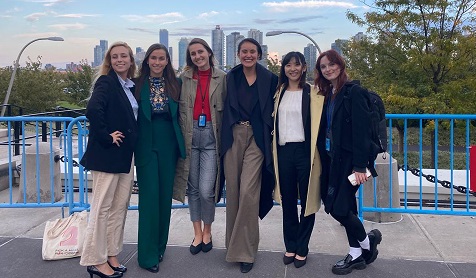
D.N.A and Gender
A recent study at United Nations Institute for Disarmament Research (UNIDIR) also shows how women are inadequately represented at United Nations (UN) meetings, including international treaties and processes that address disarmament and weapons issues, those concerning conventional weapons and weapons of mass destruction, as well as members of national delegations. At any given intergovernmental meeting on disarmament, only one quarter of the participants are likely to be women and close to half of all delegations are likely to include no women at all. Marginalizing women in these discussions is a great loss, while involving more women on the other hand will help step up disarmament discussions and advance our collective effort in creating a more secured world.
Given that the whole conversation on peace and disarmament has been perceived to be a male issue, we should find a connection on how do we support many young people and many women as possible to get in these spaces, and ensure that our future is never the same. – Mr. Patrick Karekezi (UN Youth Champion for Disarmament).
Gender mainstreaming is not just a one-off responsibility dedicated to a gender department, but a wholistic approach that is implemented across all program activities in our daily work; including a continuous assessment of the implications of policies, actions and programs on women and men in order to further gender equality. In ensuring that disarmament diplomats do something practical to better integrate gender perspective into their work, they must ensure that the full, equal and effective participation of women in all decision-making processes related to disarmament is promoted, and integrated into their work, as it is essential for the attainment of sustainable peace and security. The Secretary-General has prioritized gender parity as “a moral duty and an operational necessity”. It is further recognized in the Agenda for Disarmament that “the meaningful inclusion of women in decision-making increases effectiveness and productivity, brings new perspectives and solutions to the table, unlocks greater resources, and strengthens efforts across all the three pillars of our work”.
Looking at earlier instruments, the 1948 Universal Declaration of Human Rights as well as the UN Charter both recognize that everyone is entitled to given rights and freedoms without distinction of sex, and other status; making gender equality a key component in the foundation of the UN. – Ms. Frida Thompson (UN Associate Political Officer).
The Women, Peace and Security (WPS) agenda 1325 through its four pillars; participation, prevention, protection, and relief and recovery, also continues to be an integral instrument through which women’s involvement in domestic, as well as international peace, and security could be enhanced. It calls for increased participation and representation of women at all levels of decision-making, specific attention to the needs of women and girls in conflict, and gender perspective across all UN programming, peace support operations, and post conflict processes. WPS is echoed in the principle, that effective incorporation of gender perspectives can impact meaningfully on the lives of women; including vulnerable groups on the ground, and are critical in upholding human rights and dignity and in tackling the enablers of conflict, to create sustainable peace.
These varying gender based impacts, resulted in a seeming need to realise a gender analysis to ensure program, policy efficacy; because unfortunately, a gender analysis is still not realized in much of the security field. Gender-disaggregated data collection is therefore necessary for evidence based decisions to be made; including through surveys and interviews. – Ms. Lisa Vickers (Youth Forum Participant).
In ensuring gender parity, we can also measure women’s involvement by measuring how many women are in delegations, what proportion of the time women are speaking, how visible are they, how actively they are participating in disarmament, non-proliferation, and arms-control; because improving the representation, participation, and involvement of women in disarmament, and security discussions is the right thing to do. According to United Nations Office for Disarmament Affairs (UNODA) “Diversity, inclusion and the equal, full and effective participation and leadership by women and men in disarmament are crucial components for international peace and security and the effective operation of the disarmament machinery.”
Furthermore, we have an important role to play in not only shifting conceptions of security, but to engage youth networks, grassroot movements and organizations to mobilise change. As our outreach and teachings has the potential to influence peers and communities.
